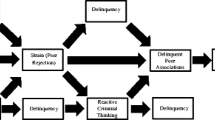Abstract
Data from the National Youth Survey (waves one and two) were used to assess the effects of individual students' perceptions of teacher disapproval on self-reported delinquency. The panel study included youths between the ages of 11 and 17. Consistent with the labeling perspective, the results indicated that perceptions of teacher disapproval are associated with subsequent delinquency. This relationship was significant even when controlling for prior delinquency, thus weakening the argument that labeling is merely a result, and not a cause, of delinquency. The effects did, however, appear to be indirect when measures of delinquent peer associations were included in the model.
Similar content being viewed by others
References
Alwin, Duane F., and Hauser, Robert M. (1975). The decomposition of effects in path analysis.American Sociological Review, 40: 37–47.
Becker, Howard (1963).Outsiders: Studies in the Sociology of Deviance. New York: Free Press.
Bohrnstedt, George W., and Knoke, David (1988).Statistics for Social Data Analysis. Itasca, IL: Peacock.
Bowles, Samuel, and Gintis, Herbert (1976).Schooling in Capitalist America. New York: Basic Books.
Elam, Stanley M., Rose, Lowell C., and Gallup, Alec M. (1994). The 26th annual Phi Delta Kappa/Gallup Poll,Phi Delta Kappan, September.
Elliott, Delbert S., Huizinga, David, and Ageton, Suzanne S. (1985).Explaining Delinquency and Drug Use. Newbury Park: Sage Publications.
Everhart, Robert B. (1983).Reading, Writing, and Resistance: Adolescence and Labor in a Junior High School. Boston: Routledge and Kegan Paul.
Kelly, Delos (1976). The role of teachers' nomination in the perpetuation of deviant adolescent careers.Education 96: 209–217.
Kelly, Delos, and Pink, William T. (1982). School crime and individual responsibility: The perpetuation of myth?The Urban Review 14: 47–63.
MacLeod, Jay (1995).Ain't No Makin' It: Aspirations and Attainment in a Low-Income Neighborhood. San Francisco: Westview Press.
Oakes, Jeannie (1985).Keeping Track: How Schools Structure Inequality. New Haven, CT: Yale University Press.
Pink, William T. and Noblit, George (1977). The consequences of labeling for early adult careers.Education 98: 32–40.
Pink, William T., and Sweeney, Mary Ellen (1978). Teacher nomination, deviant career lines, and the management of stigma in the junior high school.Urban Education 13: 361–380.
Slavin, Robert E. (1987). Ability grouping in elementary schools: Do we really know nothing until we know everything?Review of Educational Research 57: 347–350.
Slavin, Robert E., and Karweit, N. L. (1985). Effects of whole-class, ability grouped, and individualized instruction on mathematics achievement.American Educational Research Journal 22: 351–367.
Tannenbaum, Frank (1938).Crime and the Community. New York: Columbia University Press.
Tygart, C. E. (1992). Do public schools increase juvenile delinquency?Urban Education 26: 359–370.
Walberg, Herbert J., and Anderson, Gary J. (1972). Properties of the achieving urban class.Journal of Educational Psychology 63: 381–385.
Waller, Willard (1965).The Sociology of Teaching. New York: John Wiley.
Willis, Paul (1977).Learning to Labour: How Working Class Kids Get Working Class Jobs. Westmead, England: Saxon House.
Author information
Authors and Affiliations
Rights and permissions
About this article
Cite this article
Adams, M.S., Evans, T.D. Teacher disapproval, delinquent peers, and self-reported delinquency: A longitudinal test of labeling theory. Urban Rev 28, 199–211 (1996). https://doi.org/10.1007/BF02355337
Issue Date:
DOI: https://doi.org/10.1007/BF02355337




